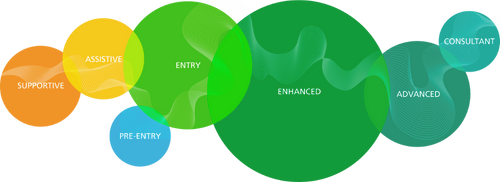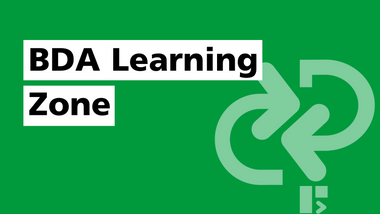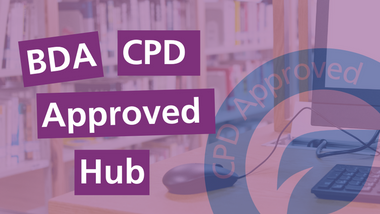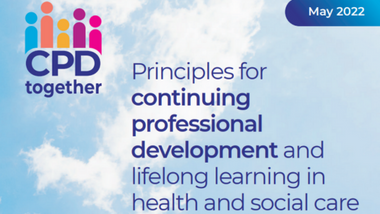What is CPD?
Professional practice develops over time, and registered healthcare professionals must continuously improve their practice so that services and service user outcomes continually improve. This process is known as continuing professional development (CPD).
As defined by the HCPC CPD is:
'the way in which registrants continue to learn and develop throughout their careers so they keep their skills and knowledge up to date and are able to practise safely and effectively’
CPD is an active process by which every day and more formal experiences are critically reflected upon to identify learning points, which are then recorded in a useful format. All healthcare professionals are required to work within their scope of practice, with the understanding that this usually changes over time.
From broad practice across the profession to a deeper understanding and expert practice in a more specialist field; CPD is an essential learning component to maintain and build on competencies, in addition to promoting evidence-based knowledge and skills in a specialised area of practice.
Planning your CPD and lifelong learning
CPD Together
The BDA recognises and promotes the importance of defining the shared responsibilities that individuals, employers and wider system stakeholders have in supporting CPD and lifelong learning across all dietetic settings, including health and social care, and as part of the multi-professional CPD Together working group, supported the development of a joint statement and set of guiding principles which are designed to guide individuals, employers and wider stakeholders to create a culture of continuous improvement and workforce development for the benefit of service users. You can visit our CPD Together webpage to find out more.
The BDA Dietetic Career Framework
The BDA recently launch its interactive Dietetic Career Framework, which is designed to support career progression and continual professional development (CPD) for the whole of the dietetic workforce. This replaces the existing Support Workforce Professional Development Framework and the Post Registration Professional Development Framework to create a single inclusive document that supports individuals from supportive roles through to consultant level practice.
Incorporating the seven levels of practice from supportive through to consultant. Each level of practice has been aligned with all relevant national frameworks identified across the four nations and described in this framework.

Whether you’re a dietetic support worker, a newly registered dietitian, or an experienced professional, this framework supports your growth, aligning to the 4 pillars of dietetic practice every step of the way. You can find out more and view the BDA Dietetic Career Framework here.
Recording your CPD
In line with other registered professions, the HCPC carries out an audit of dietitians on a bi-yearly basis, selecting 2.5% of the profession for review. Those selected are required to complete the HCPC’s profile, mapping CPD activity directly to the standards. As set out by HCPC on their CPD audit webpage there are four main components to the HCPC profile:
- the summary of your practice history
- a statement of how you have met our standards of CPD
- a list of your activities
- evidence to support your statement
You can learn more on what to do if you are chosen for HCPC Audit by visting the HCPC Audit webpage
To meet the HCPC Standards for CPD and record CPD activities within an accurate, continuous, and up-to-date record or portfolio. Keeping a thorough and up-to-date record will mean that you can submit these easily if you were selected for HCPC audit. The HCPC provide really useful information on:
- what counts as CPD.
- how to ensure your CPD is relevant.
- ensuring your CPD is relevant to the service user
- recording your CPD
Click the link here to find out more: Continuing professional development (CPD) | The HCPC
CPD activities
Any activity from which you learn or develop professionally could be classifed as CPD. Though you should ensure that these complement your practice and enhance the service you provide. The HCPC's 'What counts as CPD?' is a useful starting point when planning out your CPD.
The BDA offer an extensive range of CPD activities which includes:
- BDA Classroom and BDA eLearning via the BDA Learning Zone
- External activities approved by the BDA on the CPD Approved Hub
- Reflective practice or Facebook journal club
- Professional activity including active membership of a BDA specialist group or branch
- Research and getting involved in research and evidence.
You can search for more information on CPD and our CPD resources below:
CPD FAQ's
How do I manage and demonstrate my CPD?
You will need to:
- take a systematic approach to your CPD
- undertake CPD activities appropriate to meeting identified learning needs
- capture your learning from these activities in an appropriate way and store it
- consider how what you have learned will impact on your subsequent practice.
Am I entitled to protected CPD time?
The BDA recognises that you will need to undertake different amounts and different types of CPD during your career. The number of hours of CPD that need to be undertaken in any given year however is a matter of personal judgement and when employed within health and social care tends to be set at a local level.
And while most employed members are given time for formal CPD learning opportunities, this may not be the same for less structured activities.
Why do I need to know about and undertake CPD?
CPD requires you to demonstrate that you are keeping up to date with new knowledge, techniques and developments related to your practice. It helps ensure that quality, accountability and effective practice are readily maintained.
What happens if I am chosen for audit by the HCPC?
All dietitians on the HCPC register have an equal chance of selection regardless of where they are based, within Britain or overseas, or their current work situation (part-time, full-time or on maternity leave). The audit will cover the two years leading up to the audit, therefore newly qualified dietitians, or those returning from a career break, will not normally be called they have not been on the HCPC register for two years. For further information on the process, please visit the HCPC website.
If you are selected for audit you will receive a notification from the HCPC and will be asked to put together your CPD profile.
Please take a moment to ensure your contact details are up-to-date with both the HCPC and the BDA.
I work by myself. Can I still reflect?
You can reflect by yourself. You can, for example, write down your experiences and what lessons you have learned.
Reflecting as an individual can be useful, but you can also collaborate with others in reflection, even if you do not work with them and even if they are part of a different profession. If you do, please keep confidentiality in mind and only share the minimum amount of information necessary, anonymising personal information. For further information on HCPCs standards on reflective practice please click here: Reflective practice | The HCPC
I no longer work in a clinical (service-user) role. Can I meet the HCPC’s standards of proficiency?
Yes. Practising your profession includes all activities that draw upon the professional knowledge and skills you have gained from pre and post-registration practice. CPD activities do not have to be clinical activities for you to be able to demonstrate that you meet the HCPC standards of proficiency. In a management or other non-patient facing role the CPD evidence required will be very different to that of a clinician. You will have to be able to demonstrate how you keep up to date to enable you to perform your role and develop.
CPD evidence can be broader than just clinical skills and can be shown in different ways. E.g Leadership in Healthcare, Education in Healthcare, Research and evidence based healthcare etc.
Individuals are always advised to seek advice from HCPC if they have queries or questions relating to CPD and re registration. [email protected]
Other useful information
Apprenticeships
An apprenticeship is a real job where you learn, gain work experience and get paid. By the end of an apprenticeship, you'll have the right skills and knowledge needed for your chosen career. Apprenticeships range from level 3 to level 7, depending on your education and experience and can provide a career pathway to becoming a registered dietitian. Click here to find out more: Dietetic apprenticeships - British Dietetic Association (BDA).
The Support Workforce
There are a variety of BDA resources available to the support workforce that enabe you to keep up to date in you role and progress and develop in your career. Click here to find out more: Support workforce - BDA.
Enhanced Practice
Our new enhanced practice webpage will help you understand what enhanced practice is, where it is positioned (between entry and advanced practice), where enhanced practitioners work, education and experiences, education and developement opportunities and more.
Advanced Practice
If you are looking at working towards advance practice or advance clinical practice then you can vist the BDA Advanced Practice - British Dietetic Association (BDA) webpages to find out more.







